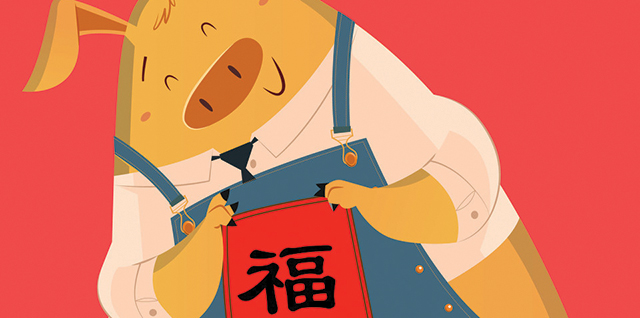豬年是時(shí)候?yàn)樨i“正名”了
China and Western countries may have different cultural beliefs about certain animals, but when it comes to pigs, we have somehow reached an agreement – that pigs are ugly, lazy, stupid and shameless.
中國(guó)和西方國(guó)家對(duì)于某些動(dòng)物或許會(huì)有不同的文化觀點(diǎn),但雙方在對(duì)豬的看法上卻達(dá)成了一致 —— 豬都是丑陋、懶惰、愚笨而無(wú)恥的。
Just look at the idioms and phrases in our languages. In Chinese, we have the likes of "Boiling a dead pig", and "A pig looking in the mirror is still a pig". And in English, there are expressions such as "eating like a pig" and "sweating like a pig". None of them are exactly complimentary.
看看我們語(yǔ)言中的一些習(xí)語(yǔ)和短語(yǔ)就明白了。中文里,我們有“死豬不怕開水燙”、“豬八戒照鏡子”等說(shuō)法。而英文里則有“eating like a pig”(狼吞虎咽)、“sweating like a pig”(汗如雨下)等表達(dá)。這些都和贊美搭不上邊兒。
But the truth is that pigs do have some finer qualities. And there's probably no better time to clear their names than now, with the arrival of the Year of the Pig on Chinese Spring Festival, which falls on Feb 5 this year.
但事實(shí)上,豬的確有些好品質(zhì)。今年2月5日,我們將會(huì)迎來(lái)農(nóng)歷豬年,或許現(xiàn)在正是為它們正名的最佳時(shí)機(jī)。
For starters, science long ago proved that pigs aren't stupid at all. According to a paper published in 2017 in the International Journal of Comparative Psychology, pigs are "mentally and socially similar to dogs and chimpanzees". They like to play. They have good long-term memories. And they know the difference between those who treat them well and those who don't.
首先,科學(xué)界很早便證實(shí)了豬一點(diǎn)兒也不笨。《國(guó)際比較心理學(xué)雜志》于2017年刊登的一篇論文認(rèn)為,豬“在心理和社交能力上類似于狗和黑猩猩”。它們喜歡玩耍,有著很好的長(zhǎng)期記憶力。它們還能辨別對(duì)自己好與不好的人。

There are lovable pig characters in cartoons too. Peppa Pig, for example, a UK animated television series that began in 2004, has now become one of the most popular cartoons in 180 countries and regions. The four members in the cartoon's pig family teach children from all around the world about love, friendship, and the value of family. And in China, the adventures of McDull, a piglet who works hard toward his dreams even though he keeps failing, have been recounted in films since 2001.
動(dòng)畫片中也有可愛的小豬形象。比如,2004年開播的英國(guó)動(dòng)畫片《小豬佩奇》現(xiàn)在成為了180個(gè)國(guó)家和地區(qū)最受歡迎的動(dòng)畫片之一。該片中的小豬佩奇一家四口教會(huì)了全球孩子們愛、友情以及家庭的價(jià)值。而在中國(guó),小豬麥兜的冒險(xiǎn)故事從2001年開始便被搬上了大銀幕,盡管不斷遇到失敗,但麥兜依然努力追逐夢(mèng)想。
"People are putting too much emphasis on efficiency and immediate results, but McDull is slow and patient, and not afraid of repeated failures," said McDull's creator Brian Tse when she was promoting the 2009 film McDull, Kung Fu Ding Ding Dong in Beijing. "He has a heart of gold."
“如今,人們?cè)絹?lái)越急功近利,而麥兜則不同。他慢吞吞的,耐心十足,即使一再遭到失敗困難也毫不氣餒,”麥兜的創(chuàng)作者謝立文2009年在北京宣傳電影《麥兜響當(dāng)當(dāng)》時(shí)如此表示。“他有顆金子般的心。”
Perhaps these are the qualities of pigs to keep in mind when we celebrate this Chinese New Year – their intelligence, cuteness, patience and innocence.
我們今年在慶祝農(nóng)歷新年時(shí),或許應(yīng)該將豬的這些品質(zhì)銘記在心 —— 它們的聰明、可愛、耐心以及純真。












